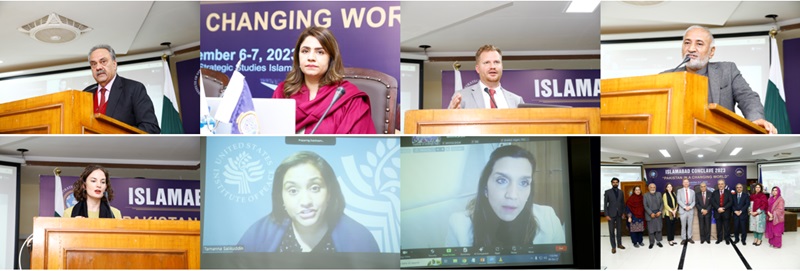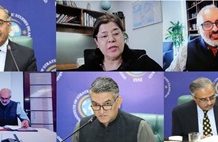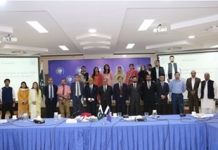Press Release
Islamabad Conclave 2023
Centre for Afghanistan, Middle East and Africa
The Institute of Strategic Studies Islamabad
‘Pakistan in a Changing World’
Session II
‘Changing Regional Landscape: From Afghanistan to Middle East’

The second working session of Islamabad Conclave titled ‘Changing Regional Landscape: From Afghanistan to Middle East’ was organized by the Centre for Afghanistan, Middle East and Africa (CAMEA) at the Institute of Strategic Studies Islamabad (ISSI) on December 6, 2023.
The speakers at the session included Ambassador Asif Durrani, Pakistan’s Special Representative to Afghanistan, Mr. Mirvais Yasini, former Deputy Speaker of the Lower House of the Afghan Parliament, Ms. Yara Mourad, Assistant Director AUB Issam Fares Institute for Public Policy and International Affairs (IFI), American University of Beirut (AUB), Ms. Tamanna Salikuddin, Director of South Asia Programs at the United States Institute of Peace (USIP), Mr. Adam Weinstein, Deputy Director of the Middle East Program, Quincy Institute for Responsible Statecraft and Ms. Elizabeth Threlkald, Seniour Fellow and Director South Asia at Stimson Center. The session was moderated by Ms. Amina Khan, Director CAMEA.
Amina Khan, in her introductory remarks, stated that the geopolitical landscape of the Middle East and Afghanistan has witnessed profound transformations in recent years, marked by a complex interplay of regional, global, and internal dynamics. She further said that the pursuit of sustainable peace in Afghanistan remains a pressing concern for the international community and the region at large. Decades of conflict, involving multiple actors with divergent interests, have left a trail of devastation and instability. She further said that the Middle East, which is often regarded as the epicenter of geopolitical complexities, is undergoing transformative changes that reshape the regional dynamics. Considering the systematic Israeli aggression and occupation, which can only amount to genocide and war crimes in the Gaza strip and is a matter of grave and must be condemned in the strongest possible terms – will without a doubt have major repercussions for regional and global peace. Amidst the unfortunate events in Gaza, the political and economic landscape in the Middle East are undergoing a significant change, with major diplomatic realignments taking place, such as the Abraham Accords & alliances such as the Quadrilateral which have changed the political landscape of the region.
Ambassador Asif Durrani, in his keynote address stated that major power rivalries have played a major role in making this present mosaic. The breakup if the Soviet Union resulted in the making of a unipolar world. The recent crisis in Gaza had sharpened the global divide and it shows how a small spark can turn into an inferno. He further said that Pakistan’s geography had a geopolitical and geo-economic value as it is a gateway to the Middle East as well. The situation in Afghanistan affects Pakistan and the situation in Afghanistan post 9/11 had many adverse consequences for the country as it affected us economically and in the security aspect as well. He went on to say that attacks by the Tehrik e Taliban Pakistan (TTP) in Pakistan have increased. On the other hand, trade with Afghanistan has increased and trade within the region has also increased significantly. Ambassador Durrani further said that with the ongoing conflict between Israel Hamas, Afghanistan has gone down the priority list for the global community. While shedding light on the situation in Afghanistan, he said that 95% people in Afghanistan are living below the poverty line and humanitarian aid is also affected. Shedding light on Pakistan’s proximity to the Middle East, he said that the region has a deep impact on political and geo-economics in Pakistan. The country receives remittances from the Middle East and the Saudi Iran rapprochement is a step in the right direction. He concluded by saying that with deft diplomacy, Pakistan can overcome challenges emanating from Afghanistan and the Middle East.
Mr. Mirwais Yasini, spoke on ‘Achieving Sustainable Peace in Afghanistan’. He said that addressing the intricate challenges in Afghanistan necessitates a nuanced and multifaceted approach. The smooth transition to the Afghan Taliban in August 2021 without significant bloodshed should be acknowledged, along with the current satisfactory security conditions and the resilient Afghan economy. The recurring exodus of the educated class poses a threat to intellectual resources, emphasizing the need for incentives to retain both younger and older educated individuals. Swift repatriation of refugees before winter is imperative to address potential humanitarian challenges. A comprehensive effort is essential, encompassing security, economic stability, constitutional development, education, inclusivity, and the retention of the educated class, all underscored by the urgency of refugee repatriation.
Ms. Yara Mourad, while speaking on the ‘Evolving Dynamics in the Middle East,’ stated that after the signing of the Abraham Accords between UAE/Bahrain and Israel on Sept 15, 2020 aiming to boost diplomatic normalization between Arab countries and Israel and to facilitate economic interdependency in the region, there was a perception that the ‘Palestinian issue’ was turning into a forgotten conflict. However, the Palestinian issue is back in force to the forefront; and this will weigh on any further developments towards normalization with Israel. She further explained that there was a realization among Arab leaders that they had to address the issue of Palestinian statehood when dealing with Israel, and this has become central to several Arab realignments. Strong pro-Palestinian solidarity movements have been re-emerged in the region and worldwide and once again states are calling for a two-state solution between Israel and Palestine.
Adam Weinstein spoke about the ‘non-security challenges in Afghanistan and the region’. He noted that the US-Pakistan relationship has shifted away from the Af-Pak paradigm, while acknowledging the inextricable link between Pakistan and Afghanistan. While security has returned to Afghanistan, areas within Pakistan, particularly in Khyber-Pakhtunkhwa, continue to face insecurity. The economies and peoples of both nations are interconnected, presenting challenges and opportunities. Four major non-traditional security crises in the region include humanitarian/economic issues, climate concerns, migration driven by the former two and political calculations, and human rights, particularly women’s rights. He added that in terms of humanitarian and economic challenges in Afghanistan, there has been a decline in aid and war economies, with frozen foreign exchange reserves and substantial funds subject to legal disputes.
Ms. Elizabeth Threlkeld, spoke on ‘Enhancing Economic and Regional Connectivity for Sustainable Development’. She was of the view that with over 97 percent of Afghans currently residing in poverty, encompassing nearly two-thirds of the population reliant on humanitarian aid for survival; the continuous need for assistance is evident. However, the fundamental question revolves around ensuring that these funds reach their intended recipients and are not misappropriated. She went on to say that proposals for a shift toward a humanitarian assistance model emphasizing livelihood generation for long-term sustainability are gaining traction, drawing the attention of multilateral entities. She highlighted the imperative of allowing women to participate in the workforce, recognizing their crucial role in societal and economic dynamics. The interconnected nature of Afghanistan’s situation with Pakistan is acknowledged, especially in the realm of trade. Trade emerges as a powerful leverage tool with the Taliban, but sustaining open borders is essential to prevent undue pressure on traders and financial losses in the event of closures. Notably, the Taliban’s success in establishing ties with regional groups adds complexity; border closures may prompt the Taliban to explore alternative alliances, emphasizing the delicate balance in managing trade dynamics for stability in the broader region.
Ms. Tamanna Salikuddin, while speaking on ‘Strengthening Economic and Regional Connectivity for Sustainable Growth,’ was of the view that recognizing that economic considerations are paramount in the current global scenario. Historically, South Asia, including Pakistan, has experienced low economic integration. She further said that the dynamics have further shifted with the end of the U.S. presence in Afghanistan, and Pakistan finds itself in a balancing act between ties with the United States and China, both vital economic partners. Emphasizing the need for an investment-friendly environment, she proposed that Pakistan should focus on strengthening internal capabilities, such as a competitive skilled workforce, to attract investment from countries like Saudi Arabia. Rather than solely relying on religious ties, she said Pakistan should prioritize building and fortifying our internal strengths. Additionally, despite political disputes, embracing trade with India could bring mutual benefits, as exemplified by the Chinese perspective on maintaining trade despite disputes. This approach would not only mitigate the energy crisis but also foster economic growth.
The session ended with a question and answer session.











